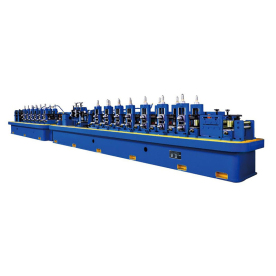[Energy-efficient Pipe mill production line]Transforming Manufacturing: Exploring the Advantages of Energy-efficient Pipe Mill Production Line for a Sustainable Future
News 2024-12-16

Transforming Manufacturing: Exploring the Advantages of Energy-efficient Pipe Mill Production Line for a Sustainable Future
In recent years, the manufacturing industry has witnessed a profound transformation toward sustainable practices, significantly influenced by rising energy costs and environmental concerns. One notable advancement in this domain is the energy-efficient pipe mill production line, a technology designed to enhance productivity while reducing energy consumption and environmental impact. This article delves into the key features, benefits, and importance of incorporating energy-efficient practices in pipe milling to create a more sustainable industrial landscape.
Understanding the Energy-efficient Pipe Mill Production Line
An energy-efficient pipe mill production line encompasses a series of advanced manufacturing processes aimed at producing pipe products with reduced energy consumption throughout the entire production cycle. These production lines integrate innovative technologies, such as advanced automation systems, smart machinery, heat recovery systems, and optimized logistics, to enhance operational efficiency while minimizing the carbon footprint associated with pipe manufacturing.
Key Features of Energy-efficient Pipe Mill Production Lines
1. **Advanced Automation Technologies:** Energy-efficient pipe mills employ state-of-the-art automation systems that optimize process control, reduce human error, and enhance precision. These advanced systems use sensors and artificial intelligence to monitor equipment performance and production metrics, allowing for real-time adjustments that minimize energy wastage.
2. **Heat Recovery Systems:** In traditional pipe production processes, significant amounts of heat generated during manufacturing are often lost as waste. Energy-efficient pipe mills integrate heat recovery systems that capture and reuse this excess thermal energy in other processes, such as pre-heating raw materials or heating water for cleaning purposes. This not only conserves energy but also reduces operational costs.
3. **Optimized Logistics and Material Handling:** The design of energy-efficient pipe mill production lines emphasizes streamlined logistics and material flow. By minimizing the distances materials must travel within the facility, manufacturers can significantly reduce energy consumption associated with transportation. Moreover, efficient scheduling and inventory management reduce idle time and enhance overall productivity.

Transforming Manufacturing: Exploring the Advantages of Energy-efficient Pipe Mill Production Line for a Sustainable Future
The Impact of Energy-efficient Pipe Mill Production Lines
1. **Cost Reduction:** One of the most immediate benefits of transitioning to energy-efficient production lines is the reduction in operational costs. By consuming less energy and optimizing production processes, manufacturers can achieve significant savings in utility expenses. This financial relief empowers organizations to reinvest in further innovation and sustainability initiatives.
2. **Enhanced Product Quality:** Energy-efficient processes often result in improved product consistency and quality. With advanced monitoring and control systems, manufacturers can ensure that the production meets stringent quality standards, leading to reduced waste and rework costs. High-quality products further enhance brand reputation and customer loyalty.
3. **Regulatory Compliance:** As governments worldwide implement stricter regulations on industrial emissions and energy consumption, manufacturers are compelled to adapt to these changes. Energy-efficient pipe mill production lines facilitate compliance with environmental regulations, helping organizations avoid penalties and fostering a more responsible corporate image.
4. **Positive Environmental Impact:** Perhaps the most compelling argument for adopting energy-efficient practices in pipe manufacturing is the positive impact on the environment. By reducing energy consumption, lowering greenhouse gas emissions, and minimizing waste production, manufacturers contribute to global efforts aimed at combatting climate change and preserving natural resources for future generations.

Transforming Manufacturing: Exploring the Advantages of Energy-efficient Pipe Mill Production Line for a Sustainable Future
The energy-efficient pipe mill production line represents a critical evolution in the field of manufacturing, symbolizing a collective shift toward sustainability and environmental responsibility. By leveraging advanced technologies, optimizing processes, and adopting eco-friendly practices, manufacturers can achieve remarkable improvements in energy consumption, cost savings, and product quality. As the world continues to prioritize sustainable development, investing in energy-efficient solutions will not only satisfy regulatory requirements but also align with the broader goals of society to foster a more sustainable future. Embracing this transformative technology is not merely an option for manufacturers; it is an essential step towards a greener economy.
